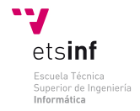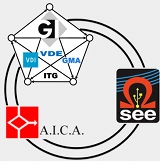Call for Papers 
Eighth European Dependable Computing Conference (EDCC-2010)
Valencia, Spain, April 28-30, 2010
Deadline Extension!
New full paper submission deadline: 9 October 2009 (23:59 GMT-12h)
Important dates
Abstract submission: 25 September 2009 (optional)
Full paper submission: 9 October 2009
Author notification: 8 January 2010
Final version of papers: 20 February 2010 (new)
Overview
Modern society increasingly relies on mission- and safety-critical computer systems whose failure can have extreme and catastrophic consequences. As the range and nature of computer technologies expand, insuring the dependability of these systems is becoming increasingly difficult, and must encompass a swathe of complementary approaches to provide emergent dependability properties such as quality of service, availability, survivability, confidentiality, and fault and intrusion tolerance. These efforts must further consider all phases of a system’s life cycle, from its inception and design, through to its use, maintenance, and decommissioning.

Organised every two years, EDCC is the leading regional conference series to discuss advances on the dependability of computer systems in Europe. As in previous years, its eighth edition aims at providing a European-hosted venue for researchers and practitioners from all over the world to present and discuss their latest research results on fault-tolerance, dependability, security, and testing. Original papers are solicited on theory, techniques, systems, and tools for the design, validation, operation and evaluation of dependable and secure computing systems, covering any fault model, from traditional hardware and software faults to accidental and malicious human interactions.
Major topics include, but are not limited to:
- Architectures for dependable systems;
- Fault tolerance in databases and transactional systems;
- Architecture and protocols for security;
- Security and dependability benchmarking;
- Security and dependability assessment;
- Computer and network security;
- Security and privacy policies;
- Fault tolerance in real-time systems;
- Critical infrastructure protection;
- Fault tolerance in multimedia systems;
- Dependability and security for mobile systems;
- Hardware and software testing, verification, and validation;
- Dependability in high-bandwidth and system area networks;
- Human factors;
- Dependability and security measurement, modelling, and evaluation;
- Formal methods for dependability and security;
- Dependability in SOA and middleware;
- Information assurance and survivability;
- Intrusion tolerance;
- Dependability and security in wireless sensor and ad hoc networks;
- Internet dependability and quality of service;
- Dependability in high performance and grid systems;
- Safety-critical systems;
- Dependability and security in business and e-commerce applications;
- Software reliability engineering;
- Dependability and security in data streaming;
- Software engineering for dependability;
- Fault-tolerant distributed systems.
As in previous years, the proceedings of the conference will be published by the Conference Publishing Service (CPS).
Paper categories
The conference is inviting submissions to its main track in the following categories.
- Regular Papers (8-10 pages) that describe original research (not submitted or published elsewhere) in the field of dependability. Note that submissions of a regular paper may indicate a willingness to be considered in another category if the submission is not accepted as a regular paper.
- Industrial Track Papers (6-8 pages) focussing on dependability in a production environment, in particular experience reports on developing and using concrete dependability-related technologies in an industrial context, war stories (success and failure), and lessons learned. Industrial Track Papers will be reviewed using specific criteria that emphasise concrete experience and relation to the real-world.
- Practical Experience Reports (3-6 pages) describing an experience or a case study, such as the design and deployment of a system or field data regarding actual failure and recovery.
- Prototype-Tool description papers (3-6 pages) that outline the design or implementation of a software tool, a prototype of an operational system, etc.
- Panels (1-2 pages) Panel proposals should describe the panel objectives, and include the bios of the Panel proposers and the probable panellists.
All papers accepted in the conference main track in any of these categories will be published in the conference proceedings.
Submission
All submissions must be made electronically through the submission web page, and should clearly indicate in which category the paper is being submitted.
https://www.softconf.com/a/edcc-8/
Submission format
The title page of each submission should include a 150-word abstract, five keywords, authors’ names and addresses and include a line specifying the submission category. The full mailing address, phone, fax and email address of the corresponding author should be indicated.
Except for information on the corresponding author and the submission category, the submission format is the same as the camera ready format. In particular, submissions must adhere to the IEEE Computer Society camera-ready 8.5″x11″ two-column camera-ready format, and respect the length requirements of their submission category. This format includes 10 point font on 12 point spacing for body text, and other details described in the author guidelines below. Pages must be numbered. Templates and further details can be found at:
http://www.computer.org/portal/site/cscps/
Each paper must be submitted as a single Portable Document Format (PDF) file. We recommend that you embed fonts where possible to improve portability. We also strongly recommend you print the file and review it for integrity (fonts, symbols, equations etc.) before submitting it. A defective printing of your paper can undermine its chance of success.
Organisation
EDCC 2010 General Chair
Pedro Gil-Vicente (pgil@disca.upv.es)
Universidad Politécnica de Valencia, Spain
Programme Committee Chair
Francois Taiani (f.taiani@lancaster.ac.uk)
Lancaster University, UK
Local arrangements chair
Juan Carlos Ruiz (jcruizg@disca.upv.es)
Universidad Politécnica de Valencia, Spain
Finance Chair
Carlos Baraza (jcbaraza@disca.upv.es)
Universidad Politécnica de Valencia, Spain
Publication Chair
David de Andrés-Martínez (ddandres@disca.upv.es)
Universidad Politécnica de Valencia, Spain
Fast Abstracts Chair
Karl M. Göschka (Karl.Goeschka@tuwien.ac.at)
Technische Universität Wien, Austria
Student Forum Chair
Mikel Larrea (mikel.larrea@ehu.es)
The University of the Basque Country (UPV/EHU), Spain
International Liaison Chairs
Eliane Martins (Universidade Estadual de Campinas, Brazil)
Takashi Nanya (The University of Tokyo, Japan)
Phil Koopman (Carnegie Mellon University, USA)
Programme Committee
Herbert Bos (Vrije Universiteit Amsterdam, Netherlands)
Peter Buchholz (Universität Dortmund, Germany)
Cristian Constantinescu (AMD, US/Romania)
Miguel Correia (Universidade de Lisboa, Portugal)
Bernard Cousin (IRISA - Université de Rennes 1, France)
Marc Dacier (Symantec Research Labs Europe, France)
David de Andrés-Martínez (Universidad Politécnica de Valencia, Spain)
Jean-Charles Fabre (LAAS-CNRS, France)
Christof Fetzer (TU Dresden, Germany)
Davide Frey (INRIA-Rennes, France)
Joaquin Gracia (Universidad Politécnica de Valencia, Spain)
Elena Gramatova (Slovak University of Technology in Bratislava, Slovakia)
Ricardo Jimenez-Peris (Universidad Politécnica de Madrid, Spain)
Flavio Junqueira (Yahoo! Research, Spain)
Mohamed Kaâniche (LAAS-CNRS, France)
Tim Kelly (University of York, UK)
Hein Meling (University of Stavanger, Norway)
Alberto Montresor (University of Trento, Italy)
Brendan Murphy (Microsoft Research, UK)
Dimitris Nikolos (University of Patras, Greece)
Marta Patiño (Universidad Politécnica de Madrid, Spain)
Leonardo Querzoni (Università di Roma “la Sapienza”, Italy)
Wolfgang Reif (Universität Augsburg, Germany)
Hans Reiser (Universidade de Lisboa, Portugal)
Luigi Romano (University of Naples Parthenope, Italy)
Ulrich Schmid (TU Vienna, Austria)
Hans-Peter Schwefel (Aalborg University, Danemark)
Luca Simoncini (University of Pisa, Italy)
Raimund Ubar (Tallinn Technical University, Estonia)
Aad van Moorsel (Newcastle University, UK)
Marco Vieira (University of Coimbra, Portugal)
Roman Vitenberg (Oslo University, Norway)
Marko Vukolic (IBM Zurich Research Laboratory (ZRL), Switzerland)
Stefan Wagner (TU Muenchen, Germany)
Josef Widder (TU Vienna, Austria)
Jie Xu (University of Leeds, UK)
EDCC Steering Committee
Karama Kanoun (Chair, France)
Algirdas Avizienis (Lithuania)
Felicita Di Giandomenico (Italy)
Ricardo Jimenez-Peris (Spain)
Johan Karlsson (Sweden)
Jean-Claude Laprie (France)
Henrique Madeira (Portugal)
Miroslaw Malek (Germany)
Jaan Raik (Estonia)
Brian Randell (UK)
Luca Simoncini (Italy)
Janusz Sosnowski (Poland)
EDCC Student Forum Programme Committee
Stéphane Devismes (Université Joseph Fourier, France)
Seth Gilbert (Ecole Polytechnique Fédérale de Lausanne, Switzerland)
Mikel Larrea (The University of the Basque Country, Spain)
Stefan Schmid (University of Paderborn, Germany)
Sara Tucci Piergiovanni (University of Rome, Italy)










